By Sam Damiano
What does it mean to be an advocate for animals? To be an animal advocate, a person believes in and fights for animal welfare, including the humane treatment of animals and their right to exist without pain, trauma and suffering. Animal advocacy can have many forms. It can be opening your home to fostering companion animals like dogs and cats to lobbying your legislators to support animal protection laws that give farm animals a better quality of life.
How do you advocate for animals?
You can advocate for animals in a number of ways. The goal is to improve the lives of animals, and any amount of effort helps – all you need to do is get involved!
It can be overwhelming at first if you are just becoming familiar with the suffering animals experience. Unfortunately, humans have been exploiting animals for decades.
For many, just starting to learn about puppy mills and dog fighting tends to spark their animal advocacy journey. Farm animal advocacy unveils a whole new level of animal abuse that we at Crate Free USA are working hard to change. If you’re unsure of where to start, we’ve put together this handy list to help you find the best way for you to contribute to meaningful change.
1. Choose an Animal Welfare Cause
As you start to inform yourself on the issues animals face, we recommend focusing on the cause that matters most to you. If they all do, think about which animals may need the most help and perhaps have less organizations dedicated to them (the reason we started Crate Free USA for farmed animals in the first place).
We believe every animal deserves compassion and a kind and safe place to live (whether that place be in a house, on a farm, or in the wild!), but fighting for animal rights can be hard. Burnout is real and your mental health matters too.
You will always have the opportunity to pivot your focus if necessary. As you become more familiar with the causes and the efforts you’re taking part in, you may also have more bandwidth to give more of yourself in the future.
Animal Cruelty
Causing pain, suffering and fear is considered animal cruelty. Animal cruelty can be intentional acts of abuse or failure to adequately provide care.
How do I advocate against animal abuse? If you ever see an animal being abused, report it to the authorities. In 2019, the PACT (Preventing Animal Cruelty and Torture) Act was signed into law to making animal cruelty a federal crime. This law unfortunately still allows for the inhumane treatment of animals on factory farms and in animal testing, which we will cover shortly.
If you are interested in becoming a better advocate for this cause the American Society for the Prevention of Cruelty to Animals (ASPCA) is a wonderful resource and non-profit organization.
Farm Animal Welfare
Did you know that farm animals are the most exploited animals on the planet? They are also the least legally and socially protected.
The treatment of animals in our industrial food system is abysmal. Animals are forced to live in cramped, unsanitary environments. They are often confined to extremely small spaces, like gestation crates, where they cannot even turn around. Mothers have their babies ripped away from them, and animals that are unproductive or that don’t serve a monetary purpose are destroyed in ways you can’t imagine like gassing, overheating, suffocation, and neglect.
In addition to the pain and suffering these animals endure, factory farming puts an immense stress on our environment and presents risks to public health. At Crate Free USA, we believe that animals like pigs and chickens should have the same protections and be treated with the same compassion as the dogs and cats in our homes. No animal should have to live a life in which their best day is their last.
Animal Testing
Animals such as rabbits, mice, and even dogs are still routinely used for not only medical testing, but testing household products like cosmetics and soaps. There is no federal law banning animal testing in the United States, and animal testing is exempt in the PACT Act mentioned earlier.
One of the easiest ways you can help animals facing these cruel tests is to refuse to buy the products. Make sure to let companies know either through their social media channels or by writing directly to them why you are forgoing their products.
Fortunately, the European Union banned the sale of cosmetics or cosmetic ingredients that have been tested on animals. This means companies all over the world will have to adjust their practices if they want to sell in the EU.
Exploitation of Animals
Animals can also face harsh living conditions and inhumane treatment when they are being exploited for our own gain. In 2020, the exploitation of so many large cats and exotic animals was revealed to the masses in the docu-series “Tiger King.” Many wild animals around the world are trapped and used for entertainment. These animals belong in the wild, not in a cage.
Animal exploitation doesn’t always have to be confinement or forcing them to perform. People exploit wildlife with sport hunting, like the fox hunts in England or despicable killing contests right here in the United States, trophy hunting in Alaska and Africa, or trapping innocent animals because they’re “inconvenient”.
Many animal species have gone extinct at the hands of humans. We need to do better at protecting them and their habitats if we want these gorgeous creatures to be here for future generations to know.
2. Volunteer with Organizations that Align with Animal Welfare Issues
Once you’ve explored the issues and narrowed down your focus, join a non-profit as a volunteer. Non-profit organizations can help you learn more about the cause and what efforts are being made to make changes. Local organizations like animal rescues are always looking for extra hands to help the animals in need.
Crate Free USA is an almost entirely volunteer based organization. Some of our volunteers lend their professional talents, some volunteers help by showing up at our events to greet visitors, and our Pig Protectors are a group of online animal activists that donate a few minutes of their time each month. Our Pig Protectors perform simple online actions that you can do from the comfort of your own home!
3. Support Legislation and Petitions that Improve the Lives of Animals
Legislation for animal welfare reduces their suffering. When actions are regulated, outlawed, and have legal consequences it sets a societal standard. A familiar organization that focuses on pushing for policy change and legislative action is the Humane Society of the United States.
As an individual, you may not have the resources or legal expertise of the Humane Society, but you can still support legislation by calling and writing letters to your representatives, and filling out witness slips to voice your opinion on state and local bills. Don’t doubt the power of petitions, they work!
In the fall of 2017, Crate Free USA launched a petition asking Trader Joe’s to commit to selling more humanely raised pork. By the spring of 2018, the company announced their new commitment to phase out many of their suppliers that used the cruel gestation crates.
We’re now focused on pushing Aldi to make similar commitments in their supply chain.
Take an actionable step now towards improving the lives of animals by signing our petition to Aldi.
4. Donate and Fundraise
Donations to organizations that are providing rescue and care, or are pushing for regulation that betters the lives of animals helps them with their operating costs. Donations can provide resources, rescue, and secure professionals to make bigger things happen. Monetary donations to registered 501(C)3 nonprofits are tax-deductible. Becoming a monthly supporter of an organization allows the nonprofit to improve their budgeting.
If you are not in a position to personally donate funds, you can always start your own fundraiser on behalf of the organization. Facebook lets you create a fundraiser in a couple clicks!
Do you have to be vegan to be an animal rights activist?
You do not have to be vegan to be an animal rights activist, you don’t even have to be vegetarian. Even if you eat meat and dairy, you can still care about animals and the way they are treated. Making more humane choices when you purchase your food is the best way to be an animal advocate without changing your diet.
Factory farms only exist to make money. They are owned by mega corporations and do nothing to help the people, animals or the environment. Buying from local farmers not only provides you with pasture-raised meat, but you are supporting a small business in your community, which will in turn spend that money in the same community.
If you live in Illinois and want to find a local farmer, farm to table restaurant, or farmers’ market nearby, download our Mobile App!
Be a Farm Animal Advocate today!
Farmed animals need our help. It is a difficult task to make strides for farmed animals, as states that are populated with CAFOs still have ag-gag laws in place that punish whistleblowers and suppress information from getting to the public.
The cause is not lost, in 2021 federal legislators reintroduced the Farm System Reform Act, and more people are becoming aware of the exploitation in our food system.
It is Crate Free USA’s mission to reduce the suffering of animals on factory farms. Join us in our fight by volunteering with our organization.
Author Bio:
Sam Damiano is a data and marketing specialist who has held multiple volunteer roles for Crate Free USA since December of 2016. She enjoys volunteering and takes pride in working with a variety of non-profit organizations fighting for a better world for humans and animals. Outside of work and volunteering, she can be found surrounded by dogs, building guitars, or practicing martial arts.
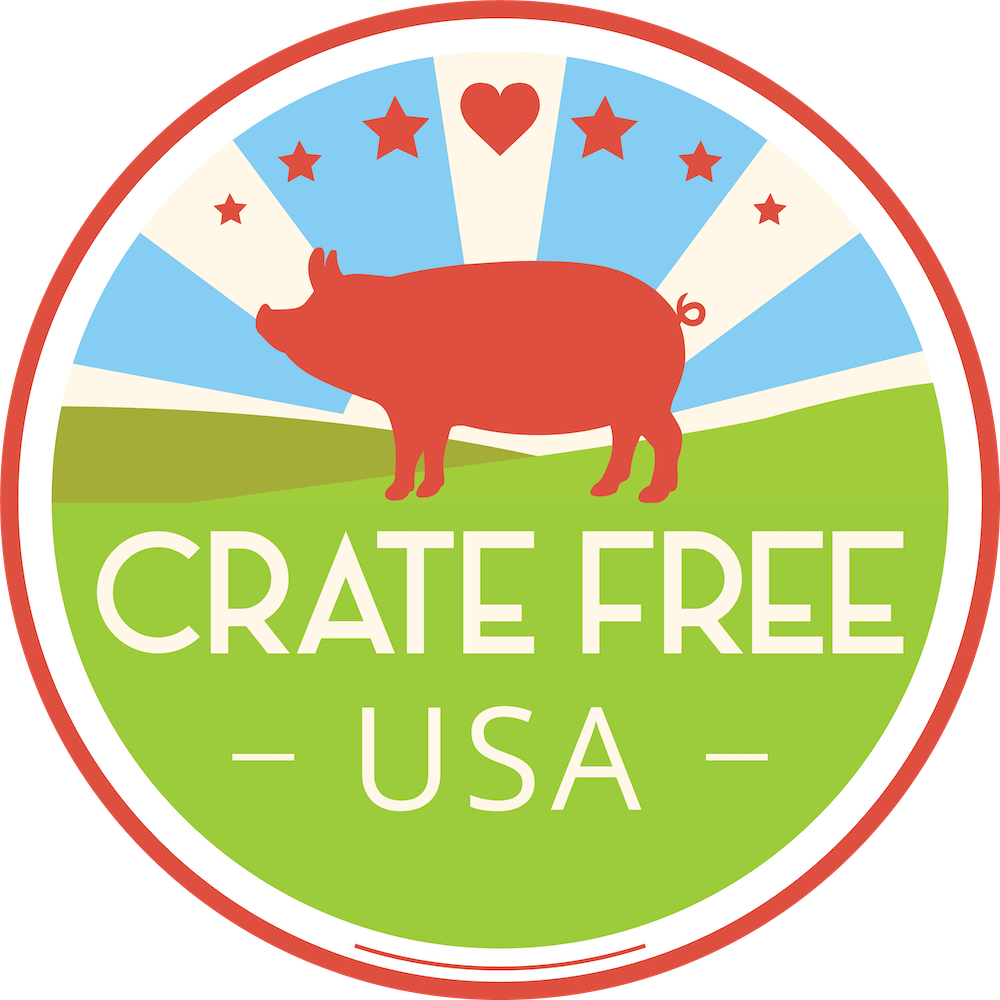
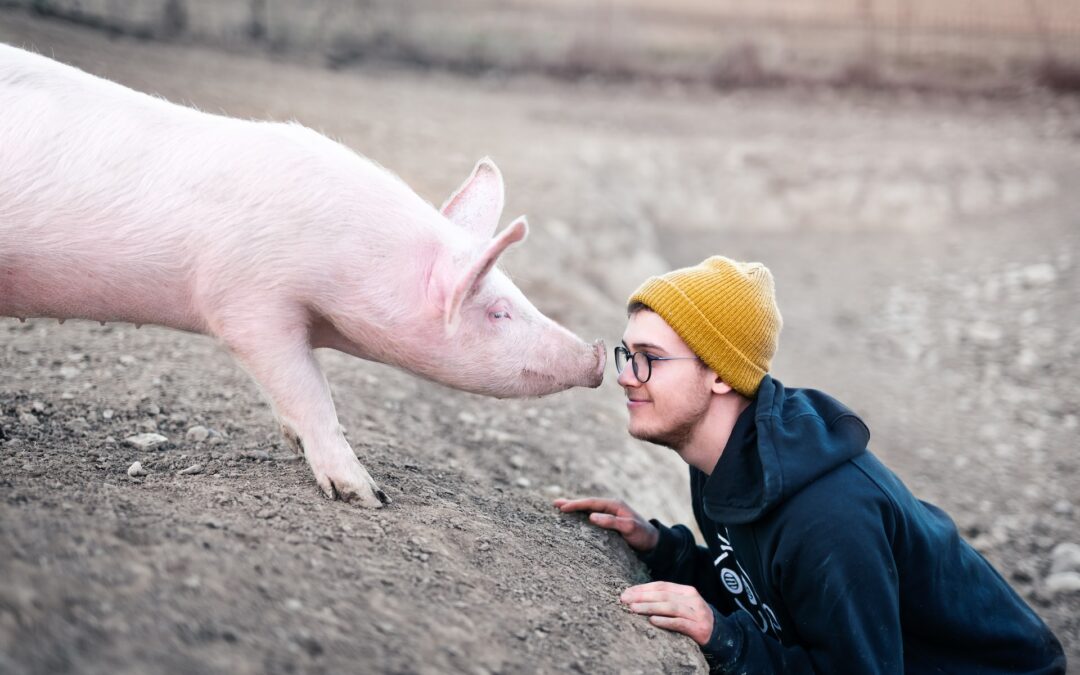
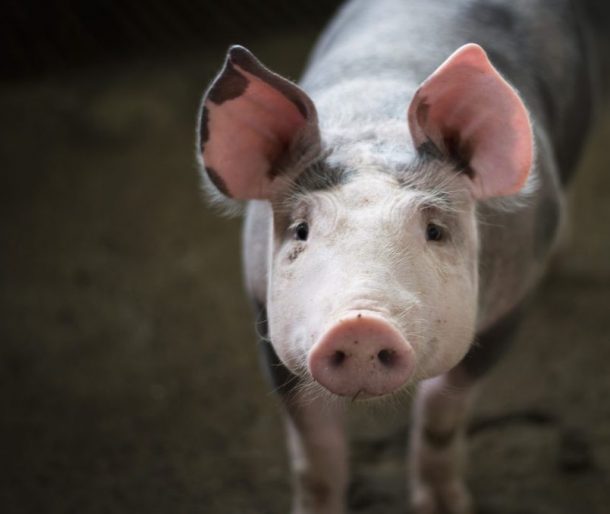
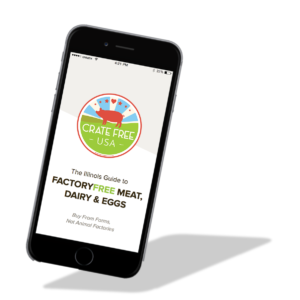
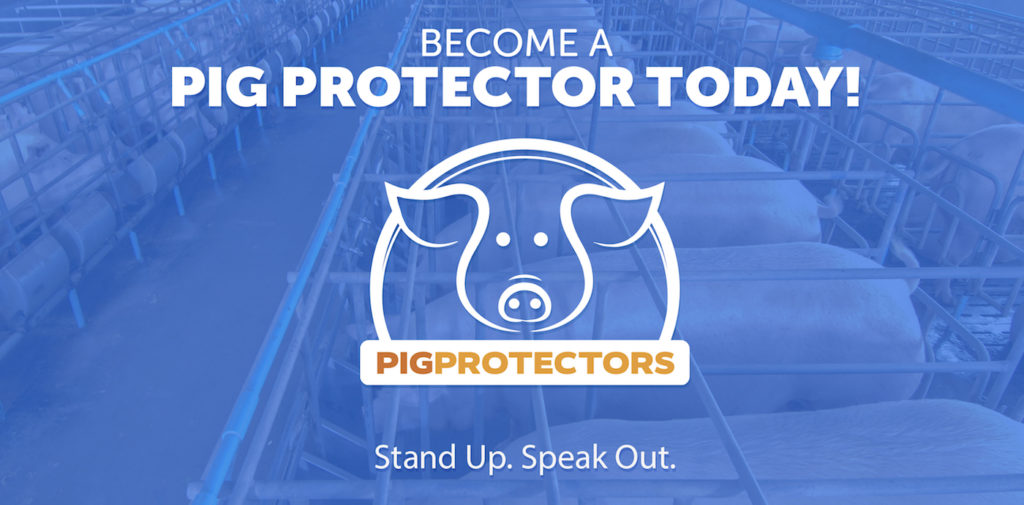
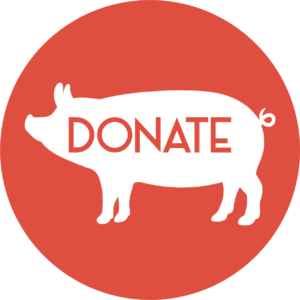
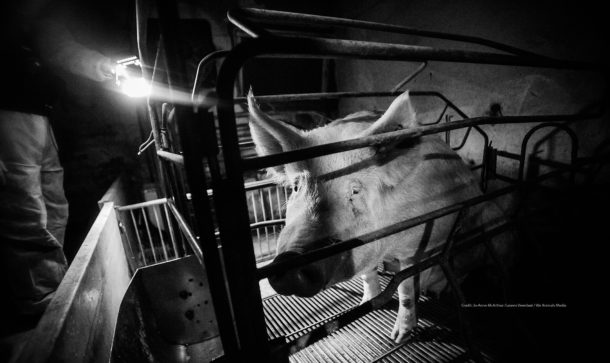
Do you hold events in Los Angeles where I could volunteer?
Hi Karen! Thanks for your interest. Currently, we don’t hold events in L.A., but we have volunteers from all over the country help us with our campaigns.
IF you are interested in joining our volunteer team, please click on the volunteer page and drop us a note!
Thank you!
How do we close factory farms?
please, reconsider: you should reject ALL ANIMAL EXPLOITATION to be considered an animal rights activist WITHOUT being a hypocrite.
you cannot exploit animals with their INFORMED CONSENT, so it is NOT ETHICAL to exploit them.
you can keep asking for bigger fields, better food for the animals, better veterinary care, but if you still exploit them, you are still abusing them, using them for your own benefit.
you can not claim to care about someone if the reason you care for them is because you want to take something from them.